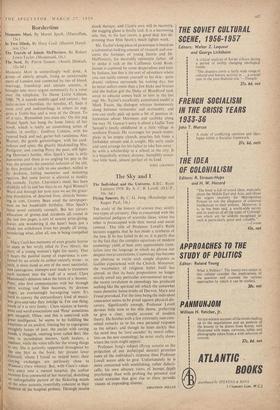The Sky and I
THE study of the history of. science may satisfy two types of curiosity. One is concerned with the intellectual pedigree of scientific ideas, whilst the other is preoccupied with their moral and social context. The title of Professor Lovell's Reith lectures suggests that he has made a synthesis of the two. If he has failed to do so, it is partly due to the fact that the complex equations of modern cosmology yield, at best, only approximate trans- lation into the language in which we phrase our deepest moral convictions. Cosmology has become too abstruse to excite such simple disputes as Galileo experienced with the Church. Moreover, the vocabulary of religious belief itself has altered, so that its basic propositions no longer strictly entail any particular astronomical set-up: the recent revolution in cosmology has produced nothing like the spiritual stir which the somewhat more domestic home truths of Darwin, Marx and Freud provoked. For the time being the individual conscience seems to be proof against physical dis- covery. Significantly enough, Professor • Lovell devotes little time to his title theme, preferring to give a clear, simple account of modern theory. He finishes with a few extremely non-com- mittal remarks as to his own personal response to the subject, and though he hints darkly that the mind may be 'torn asunder' by moral reflec- tion on the new cosmology, he never really shows where the rents might appear.
Professor Jung's subject (flying saucers as the projection of our archetypal desires) promises more of the individual's response than Professor Lovell seems able to give. Unfortunately lie is more concerned with establishing, rather didacti- cally, his own obscure views of human depth psychology than with probing the personal and social anxieties that give rise to these periodic visions of impending disaster.
JONATHAN MILLER






































 Previous page
Previous page